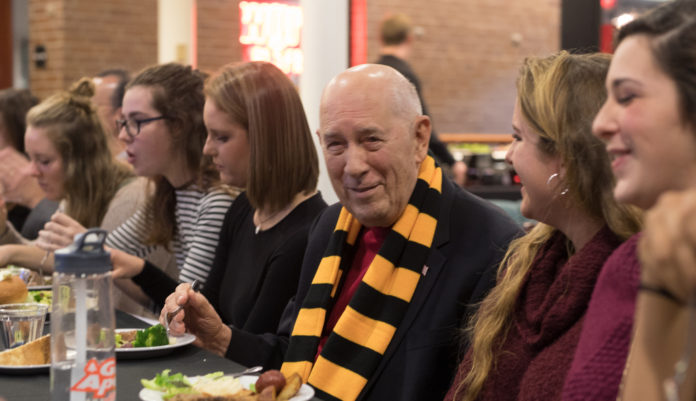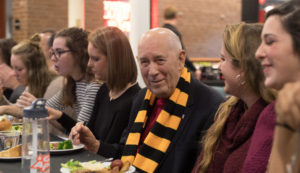

Bill Rasmussen almost didn’t come to DePauw. When asked about his experience, he’ll smile and recall how he narrowly made the cut as a Rector Scholar. What a difference four years can make. Having graduated from the University in 1954, the founder of ESPN has returned to Greencastle for one of the biggest sporting events of the school year, the Monon Bell football game. Yesterday, The DePauw had the opportunity to briefly talk with Rasmussen about the sports world.
The DePauw (TDP): The Monon Bell game is one of the biggest rivalries in college sports. What has been another one of your favorite rivalries over your sports career?
Bill Rasmussen (BR): In baseball, it was always the White Sox and Yankees. As a matter of fact, my senior year (at DePauw), I roomed with an avid Cubs fan. So we didn’t talk baseball because it always got heated. But here at DePauw, I think the Wabash rivalry just overpowers any other memories.
TDP: In your talk with the Media Fellows, you encouraged students to keep pushing themselves no matter what people tell you. Was that the case with ESPN?
BR: Yes. That happened with ESPN a lot. Taft Broadcasting used to be a premiere broadcasting group, and we were pitching ESPN looking for investment dollars. We went to a (Taft) board meeting to sell it. At the end, the chairman figuratively patted me on the head and said, “You’re a nice young man, but I have to tell you, your idea is never, ever going to work…” It sounds arrogant, and I don’t mean it that way, but when that gentleman said that, my reaction was not being crushed. My reaction was that he just made a big mistake because this is going to work. We just kept going.
TDP: You’ve developed a lot of friendships with athletes over the years, and one thing you noticed was how they could rarely talk about anything but sports. Having played sports yourself, do you ever think about what life would’ve been like as a professional athlete?
BR: When you’re at this end looking forward, it’s the greatest thing. But in 1970, I started broadcasting baseball in the Eastern League in Double or Triple A. After about 20 or 25 games, I thought, “This is the most boring job in the world.” The repetitiveness of it, it’s always the same.
TDP: Why have you strayed away from mixing politics with sports?
BR: I just don’t talk about it. In November when we have an election, people are going to claim fraud, they’re going to do this, they’re going to do that… And there’s going to be political arguments about it. One thing that athletics does is, if you don’t cross the goal line with the ball in your hand when there’s time on the clock, it doesn’t count. It’s not an opinion, it’s not “oh I think you were…” My reaction to politics is a ball is a ball, a strike is a strike, a goal is a goal. Sports are not open to debate.
